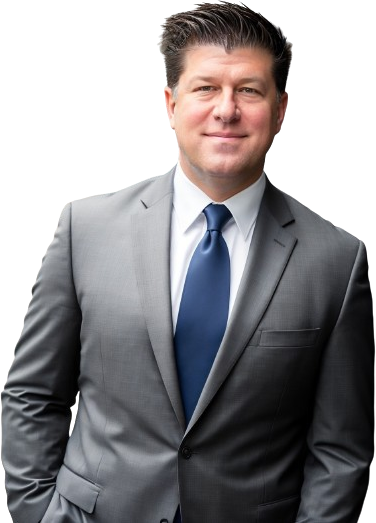
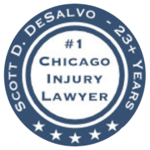

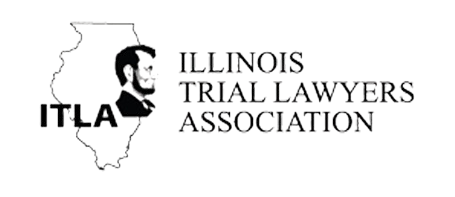
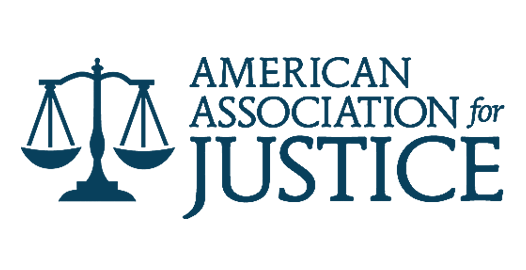
When I was nine years old, my dad got catastrophically injured at work.
He was a truck driver. A Teamster. A working guy who used his body to put food on our table. That injury took everything from him. His case dragged on for 17 years. Seventeen years of the insurance company running him around. And at the end? His own lawyer sued him for more money.
I'll never forget watching that happen to my family.
When I became a lawyer, I saw the same thing happening to other people. Injured folks getting screwed over by the system. But medical malpractice cases? Those are even worse.
When a doctor makes a mistake that destroys your life, the hospital circles the wagons. The lawyers show up with their briefcases and their excuses. And the patient—the person who trusted their doctor with their life—gets crushed.
Not if I'm your lawyer.
Look, I know you're here because something terrible happened. Maybe it was at Northwestern Memorial, or Rush, or University of Chicago Medical Center. Maybe it was at a clinic in the suburbs. Maybe your baby was hurt during delivery. Maybe the surgeon operated on the wrong body part. Maybe the ER doctor sent you home when you were having a heart attack.
Whatever happened, I want to hear about it.
I'm Scott DeSalvo. I'm a Chicago medical malpractice lawyer who actually gives a damn. And I'm available right now.
Call me at (312) 500-4500. Any time. Seriously—2 a.m., Sunday afternoon, Christmas morning. Whenever. I'll answer.
No money out of pocket. No fee until we win. Free consultation 24/7/365.

Every lawyer says they care about their clients. But here's the thing—I've lived through what you're going through.
Watching my dad's life fall apart after his injury, seeing the insurance company play games for 17 years, watching his own lawyer betray him at the end—that changed me. We went from being okay to being poor. My dad couldn't work. The bills piled up. And his lawyer just saw dollar signs.
I put myself through high school, college, and law school with one mission: make sure that never happens to another family.
When I handle a medical malpractice case, I'm not thinking about my fee. I'm thinking about my dad lying in bed, wondering how he's going to feed his kids. I'm thinking about that feeling of betrayal when the people who are supposed to help you make everything worse.
That's why I treat every client like family. Not because it sounds good. Because I mean it.
Your fight is my fight.
Let me break this down in plain English, because the legal definition is a bunch of garbage.
Medical malpractice happens when a doctor, nurse, hospital, or other healthcare provider does something wrong—or doesn't do something they should have done—and it hurts you.
Doctors aren't perfect. I get that. Medicine is hard, and sometimes bad things happen even when everyone does everything right. That's not malpractice.
Malpractice is when they screw up in a way that other competent doctors wouldn't have. And that mistake causes you harm.
To have a real case, you need four things:
1. You Had a Doctor-Patient Relationship
Pretty straightforward. If the doctor treated you, you had a relationship. If some doctor gives you advice at a party, that doesn't count. But if you went to a hospital in Chicago and got treated, you're good here.
2. The Doctor or Hospital Was Negligent
This is the heart of it. Did they mess up? Did they do something a competent doctor wouldn't have done?
Like:
3. That Mistake Caused Your Injury
It's not enough that they messed up. That mistake has to be what hurt you. If the doctor prescribed the wrong medication but you never took it, you don't have a case. But if you took it and it caused kidney failure? Now we're talking.
4. You Got Hurt
You need real damages. Medical bills, lost wages, pain, disability, or—worst case—death.
If you're not sure whether you have a case, just call me. The consultation is free. I'll give you my honest opinion. If you don't have a case, I'll tell you straight up. If you do, we'll talk about what to do next.
We'll talk like friends. No pressure. No BS.
Medical malpractice cases aren't like car accidents. They're way more complicated, way more expensive, and most lawyers won't touch them.
Here's why:
You Need Expert Witnesses
In Illinois, you can't just tell the jury your doctor screwed up. You need other doctors—experts in the same specialty—to testify that your doctor messed up. Finding these experts, paying them, getting them ready to testify? That costs tens of thousands of dollars.
Most lawyers can't afford it or won't spend the money. I do.
Medical Records Are Like Reading Greek
Your medical records might as well be written in code. Understanding what actually happened means going through hundreds or thousands of pages of doctor's notes, test results, and hospital charts. You need someone who knows what they're looking at.
The Clock Is Ticking
In Illinois, you've got two years from when you discovered the injury to file a lawsuit. There's also a hard deadline of four years from when the malpractice happened, no matter when you found out. Miss that deadline, and your case is dead. Forever.
You Need Something Called an Affidavit of Merit
This is a sworn statement from another doctor saying they reviewed your records and think you have a real case. Getting this takes time and money. (You can read the Illinois Medical Malpractice law for yourself here.)
The Defense Lawyers Are Brutal
Hospitals and doctors have malpractice insurance, and those insurance companies hire the most aggressive defense lawyers in Chicago. They'll use every dirty trick to deny your claim, attack your credibility, and wear you down. thats why you need a top medical malpractice lawyer Chicago on your side.
You need someone who won't back down.
That's me.

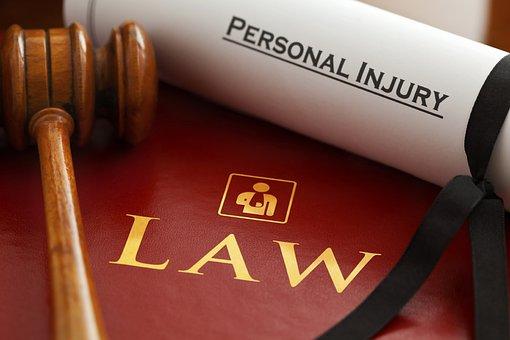

I've seen every type of medical screw-up you can imagine. These cases happen at big hospitals downtown, at suburban medical centers, at little clinics, everywhere.
Here are the most common ones:
These cases break my heart every time.
You're having a baby. You trust your OB, the nurses, the hospital to bring your child safely into the world. And when they mess up—when they miss signs your baby's in trouble, when they wait too long to do a C-section, when they use forceps wrong—the results are devastating.
I've represented families whose babies have permanent brain damage, cerebral palsy, broken bones. I've represented mothers who died or were seriously injured because of negligence during delivery.
If your baby was hurt at Northwestern Memorial, Rush, University of Chicago Medical Center, Advocate Christ, or anywhere else in Chicago, call me. Even if the doctors say "these things just happen," that's not always true. Sometimes they happen because someone made a mistake.
Surgery is risky. Complications happen. But there's a difference between a known risk and negligence.
Wrong-site surgery? That's when they operate on the wrong body part or even the wrong patient. Yes, this actually happens.
Leaving surgical tools inside you? Sponges, instruments, whatever. That causes infections and means more surgeries.
Damaging nerves or organs during surgery? Sometimes it's unavoidable. Sometimes it's because the surgeon was careless.
Anesthesia mistakes? Giving too much or too little, not monitoring you properly, screwing up the intubation—these can cause brain damage or death.
Post-surgical infections? When hospitals don't keep things sterile, patients get MRSA, sepsis, all kinds of nasty infections.
Cancer. Heart disease. Stroke. Infections. Blood clots.
All of these are treatable if caught early. But when a doctor misses the diagnosis or delays treatment, patients lose their chance.
I've represented people whose doctors:
If you had cancer that was missed on a scan, if your heart attack symptoms were dismissed in the ER, if your stroke warning signs were ignored—call me at (312) 500-4500.
H3: Medication Errors
Wrong medication. Wrong dose. Dangerous drug interactions. Giving medication to the wrong patient. Pharmacy screw-ups.
These mistakes kill people. I've handled cases where patients suffered kidney failure, liver damage, strokes, heart attacks, and death because of medication errors.
ERs at Northwestern, Rush, University of Chicago Medical Center, and other Chicago hospitals are crazy busy. Doctors and nurses are overworked and understaffed.The best of the best medical malpractice lawyer Chicago knows which hospitals are notorious for such problems.
But being busy doesn't excuse negligence.
Sending someone home who's having a heart attack? Missing a stroke? Not ordering the right tests? Discharging patients too early? That's malpractice.
Putting your loved one in a nursing home is one of the hardest decisions you'll ever make. And when that nursing home fails them—when they develop bedsores, when they fall because no one's watching them, when they're dehydrated or malnourished or given the wrong medication—it's heartbreaking.
I've represented families whose loved ones suffered terrible injuries or died because of neglect at nursing homes throughout Chicago and the suburbs. These cases make me angry, and I fight them hard.
Anesthesia mistakes are some of the scariest because they can cause brain damage or death within minutes.
Too much anesthesia. Too little. Not reviewing your medical history. Not monitoring your vital signs. Intubation errors. Any of these can kill you.
If you or someone you love suffered a brain injury or died related to anesthesia during surgery in Chicago, call me, your medical malpractice lawyer Chicago, immediately.

Medical malpractice happens at the best hospitals and the worst hospitals. It happens downtown and in the suburbs. It happens everywhere.
I've handled cases at:
Big name doesn't mean good care. Teaching hospitals sometimes have the highest error rates because residents are learning on patients.
No matter where your injury happened—downtown Chicago or out in the suburbs—if you were hurt by medical negligence, you deserve justice.
Find Out What YOUR Case Might Be Worth...for free.

I wish I could give you a number, but every case is different. Here's what we fight for:
Everything you've spent and will spend on treatment:
If the malpractice left you with a permanent injury that needs ongoing care for life, we calculate all those future costs.
If you missed work, you get compensated for every paycheck you didn't receive. If you can't work anymore or can't work at the same level, you deserve compensation for that lost earning capacity.
I've represented people who lost their careers as nurses, construction workers, teachers, office workers. People who can't do the physical work anymore. People who suffered brain injuries and can't work at all.
Your ability to earn a living has real value.
Insurance companies hate this one. They'll say it's "subjective" or "hard to measure."
That's BS.
Pain and suffering is real. As a medical malpractice lawyer Chicago, I know how to prove it to a jury.
I document your daily pain, how the injury affects your life, activities you can't do anymore, sleep problems, emotional distress, anxiety, depression, loss of independence.
I've spent over $100,000 on advanced trial training—including graduating from Gerry Spence's Trial Lawyer's College and "The Edge" program—specifically so I can present pain and suffering damages in a way that moves juries.
If your loved one died due to medical malpractice, you may be entitled to compensation for:
These cases are heartbreaking. But they're important because holding negligent doctors and hospitals accountable can prevent the same thing from happening to another family.
How much is your case worth?
It depends on your injuries, the evidence, the insurance coverage, and a lot of other factors.
I've settled medical malpractice cases for hundreds of thousands to millions of dollars. The only way to know what your case is worth is to call me.
(312) 500-4500. Free consultation.
There are lots of medical malpractice lawyers in Chicago. Some are pretty good.
But here's what makes me different:
This isn't marketing BS. It's how I operate.
You deserve to have your calls answered. You deserve a lawyer you actually like and trust. You deserve to know what's happening with your case.
When you work with me, you're not just another file number. You're family.
To get every dollar my clients deserve, I've spent over $100,000 on advanced trial training over the past two decades.
I'm a graduate of Gerry Spence's Trial Lawyer's College. Not one in 10,000 lawyers has completed this training.
I'm also a graduate of "The Edge" program through KTI. This is cutting-edge stuff that teaches lawyers how to present complex medical malpractice cases to juries in ways that win.
Why does this matter?
Because insurance companies know who I am. They know I'm trained. They know I'll take cases to trial. And that makes them pay more in settlements.
I don't handle cases the way everyone else does. I've developed my own system for investigating malpractice cases, building evidence, working with experts, and presenting claims that maximizes value.
I start building your case from day one like we're going to trial, even though about 90% of my cases settle.
Result? My clients get more money, faster.
This isn't just something I say. It's real.
Call me at 2 a.m. on a Tuesday. Call me on Christmas. Call me on Sunday afternoon when you're panicking.
Medical malpractice is traumatic. Questions don't wait for business hours. Neither do I.
Medical malpractice cases are expensive. Expert witnesses can cost $50,000 or more. Record reviews, depositions, court costs—it adds up fast.
You don't pay any of that.
I advance all costs. You pay nothing upfront. If I don't win, you don't owe me anything.
My fee is 33⅓% of whatever I recover. Standard rate, set by Illinois law.
If I don't win, you pay me nothing.
Some lawyers represent injured people and also defend insurance companies. Not me.
I only represent injured people. Never defense. Never insurance companies.
Your fight is my fight. Period.

Let me walk you through what happens when you hire me.
You call me at (312) 500-4500 or contact me through my website. We set up a time to talk—phone, my office in Chicago, your home, wherever you're comfortable.
We talk about what happened. I listen. I ask questions. I try to understand what you're going through.
Then I give you my honest opinion.
If you have a strong case, I'll tell you. If your case has problems, I'll explain them. If you don't have a case, I'll tell you that too—and try to point you in the right direction.
No sales pressure. No BS. We talk like friends, and you decide if you want to hire me.
Either way, we end up as friends.
Once you hire me, I get to work immediately.
I get all your medical records from every doctor and hospital involved. I review every page—sometimes hundreds or thousands of pages.
I also:
The more we know early, the stronger your case gets.
You can't win a medical malpractice case without expert doctors willing to testify that the defendant screwed up.
I've built relationships with top medical experts over the years. When I need an obstetrician, surgeon, radiologist, whatever—I know who to call.
These experts review your records, give written opinions about what went wrong, and prepare to testify.
They're expensive, but they're crucial. And I pay for them, not you.
In Illinois, medical malpractice lawsuits need something called an "affidavit of merit." That's a sworn statement from a qualified doctor saying they reviewed your records and think you have a real case.
I work with my experts to prepare this, then I file your lawsuit—usually in Cook County Circuit Court if it happened in Chicago.
Filing a lawsuit sounds scary, but it's often necessary to get the insurance company to take you seriously.
This is where both sides exchange information and take depositions (sworn testimony before trial).
I'll depose the doctors and nurses who treated you, hospital administrators, experts, anyone relevant.
The defense lawyers will depose you too. I'll prepare you so you're ready.
This phase takes time—months or even years in complex cases. But I keep you informed every step.
Most medical malpractice cases settle before trial. But they only settle for fair amounts when you have a lawyer willing to go to trial.
I negotiate aggressively. I present your case backed by expert opinions and solid evidence.
Many cases go to mediation, where a neutral third party helps negotiate. I've done hundreds of these.
But here's the key: I never pressure you to accept a settlement you're not comfortable with. It's your case, your life, your decision. I give you my opinion, but the final call is yours.
If the insurance company won't offer fair compensation, I'm ready to take your case to trial.
Medical malpractice trials are complex. They need meticulous preparation and the ability to explain complicated medical stuff to regular people on a jury.
That's exactly what my training prepared me for.
I've tried cases throughout Chicago and Illinois. I'm not intimidated by hospital defense teams. I know how to pick a jury, present evidence, examine witnesses, and deliver closing arguments that win.
About 90% of my cases settle. But the insurance companies know I'm willing to go the distance. That's why my settlements are usually higher.
Whether we settle or go to trial, the goal is the same: get you maximum compensation so you can move forward with your life.
When you get your check, you'll know we fought for every dollar.

In Illinois, generally two years from when you discovered the injury. There's also a hard deadline of four years from when the malpractice happened, no matter when you found out.
For kids under 18, the rules are different. They have eight years from the malpractice, but not past their 22nd birthday.
Bottom line: don't wait. Call me at (312) 500-4500 now. Every day you wait, evidence disappears and memories fade.
Nothing upfront. Zero.
I work on contingency:
My fee is 33⅓% of whatever I recover. Standard rate in Illinois.
So if I recover $300,000, my fee is $100,000. If I recover $1 million, my fee is $333,333. If I don't recover anything, my fee is zero.
You have nothing to lose.
Depends on complexity.
Simple cases might settle in 6-12 months.
Complex cases can take 2-4 years.
Cases that go to trial take longer than cases that settle.
I work as fast as possible to get you money as quickly as possible. But I won't rush if taking more time means getting you more money.
I'm so sorry.
If your loved one died due to medical negligence, you may have a wrongful death claim. In Illinois, these can be brought by the spouse, children, parents (if no spouse or kids), or the estate's personal representative.
Wrongful death damages include funeral costs, loss of financial support, loss of companionship, and grief.
Call me at (312) 500-4500. I'll handle it with compassion.
It's a sworn statement from another doctor in the same specialty saying they reviewed your records and think you have a legitimate case.
Illinois requires this to prevent frivolous lawsuits.
Getting one requires me to get all your records, find a qualified expert, have them review everything, and get them to sign a sworn statement.
I handle all of it. You don't have to worry about it.
Maybe. Just because you signed a consent form listing risks doesn't give doctors a free pass to be negligent.
If the doctor's actions fell below the standard of care—if they made mistakes a competent doctor wouldn't have made—you still have a case, even if you signed a form.
Don't let them hide behind a consent form. Call me and let's talk about what really happened.
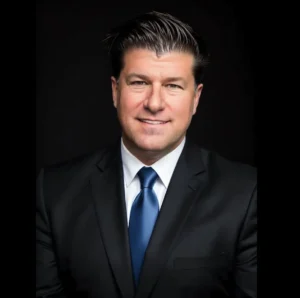
I represent people everywhere in the Chicago area:
Chicago Neighborhoods: Loop, River North, Gold Coast, Lincoln Park, Lakeview, Wicker Park, Logan Square, Pilsen, Bridgeport, Hyde Park, South Shore, Beverly, Old Town, West Loop—all of them.
Suburbs: Evanston, Skokie, Oak Park, Naperville, Aurora, Joliet, Schaumburg, Arlington Heights, Des Plaines, Elmhurst, Downers Grove, Wheaton—throughout Cook County, DuPage County, Lake County, Will County, Kane County.
I also handle cases throughout Illinois and sometimes in other states.
No matter where the malpractice happened—Northwestern Memorial downtown, Advocate Christ in Oak Lawn, Edward Hospital in Naperville, or a small clinic somewhere in the suburbs—I can help.
Hiring Scott was one of the best moves I have made in my life. Scott is a down to earth person and attorney. Scott is a 5 star first class act who really knows his stuff. The Judge said his presentation was one of if not the best he had ever seen. Take my advice, hire Scott I’m sure you’ll be 200% satisfied I was.

Scott not only cares about the case, but he truly cares about his clients and that makes him the best lawyer I have ever met and hired! He won my case! He is thorough in everything he does. I highly recommend Scott, and will always refer him to family and friends.

I hired Scott DeSalvo upon a friend’s recommendation. His office kept me informed of developments as they happened, and I felt the settlement reached was fair considering my injuries. I would highly recommend Scott DeSalvo to represent your personal injury case.

How much longer are you going to wait?
Every day you wait, the insurance company is building its defense. Every day you wait, evidence disappears, witnesses forget things, and the statute of limitations gets closer.
I know you're scared. I know you're in pain. I know you're worried about medical bills, about whether you'll get better, about how you're going to support your family.
I get it. My family's been there.
But you don't have to fight this alone.
When my father was injured, he felt alone. He felt helpless. He felt like the insurance companies and the lawyers and the whole system were against him.
That's not going to happen to you.
When you work with me, you've got someone in your corner who actually cares. Someone who will fight for you like you're family. Someone who has dedicated his life to making sure injured people don't get screwed.
Your fight is my fight.

Here's what you do:
Call me at (312) 500-4500 right now. Any time—2 a.m., Sunday, Christmas, whenever.
When we talk:
My promise:
✓ No money out of pocket
✓ No fee until we win
✓ Free consultation 24/7/365
✓ I only get paid if you get paid first
You've already been hurt once by a doctor or hospital you trusted. Don't let the insurance company hurt you again.
Call (312) 500-4500 right now.
Don't wait another day. The sooner you call, the sooner I can start fighting for you.
I'm Scott DeSalvo. I treat clients like family, I've invested over $100,000 in elite training, and I've dedicated my life to making sure what happened to my family never happens to yours.
Your fight is my fight. Let's go.
Call (312) 500-4500 now.



Scott DeSalvo founded DeSalvo Law to help injured people throughout Chicago and surrounding suburbs. Licensed to practice law in Illinois since 1998, IARDC #6244452, Scott has represented over 3,000 clients in personal injury, workers compensation, and accident cases.
No Fee Unless You Win | Free Consultation | 24/7 Availability Call or Text: (312) 500-4500
>>Read More
Main Office:
1000 Jorie Blvd Ste 204
Oak Brook, IL 60523
New Cases: 312-500-4500
Office: 312-895-0545
Fax: 866-629-1817
service@desalvolaw.com
Chicago and Other Suburban Offices
By Appointment Only